MBA506 Negotiation Role Play & Summary: Thinking Styles and Report
VerifiedAdded on 2023/06/11
|10
|2414
|442
Report
AI Summary
This report presents a negotiation role play scenario involving an advertising corporation negotiating an endorsement contract with a celebrity. It includes a pre-negotiation assessment covering BATNA, reservation values, and ZOPA range for both parties. The negotiation stage details communication logs and a sample negotiation letter. The post-negotiation stage includes a letter to the client outlining the negotiation outcome, key elements to consider for future negotiations, and advice on ensuring clear communication and confidentiality. The report concludes with references to relevant research on negotiation strategies and processes. Desklib offers more solved assignments and study tools for students.
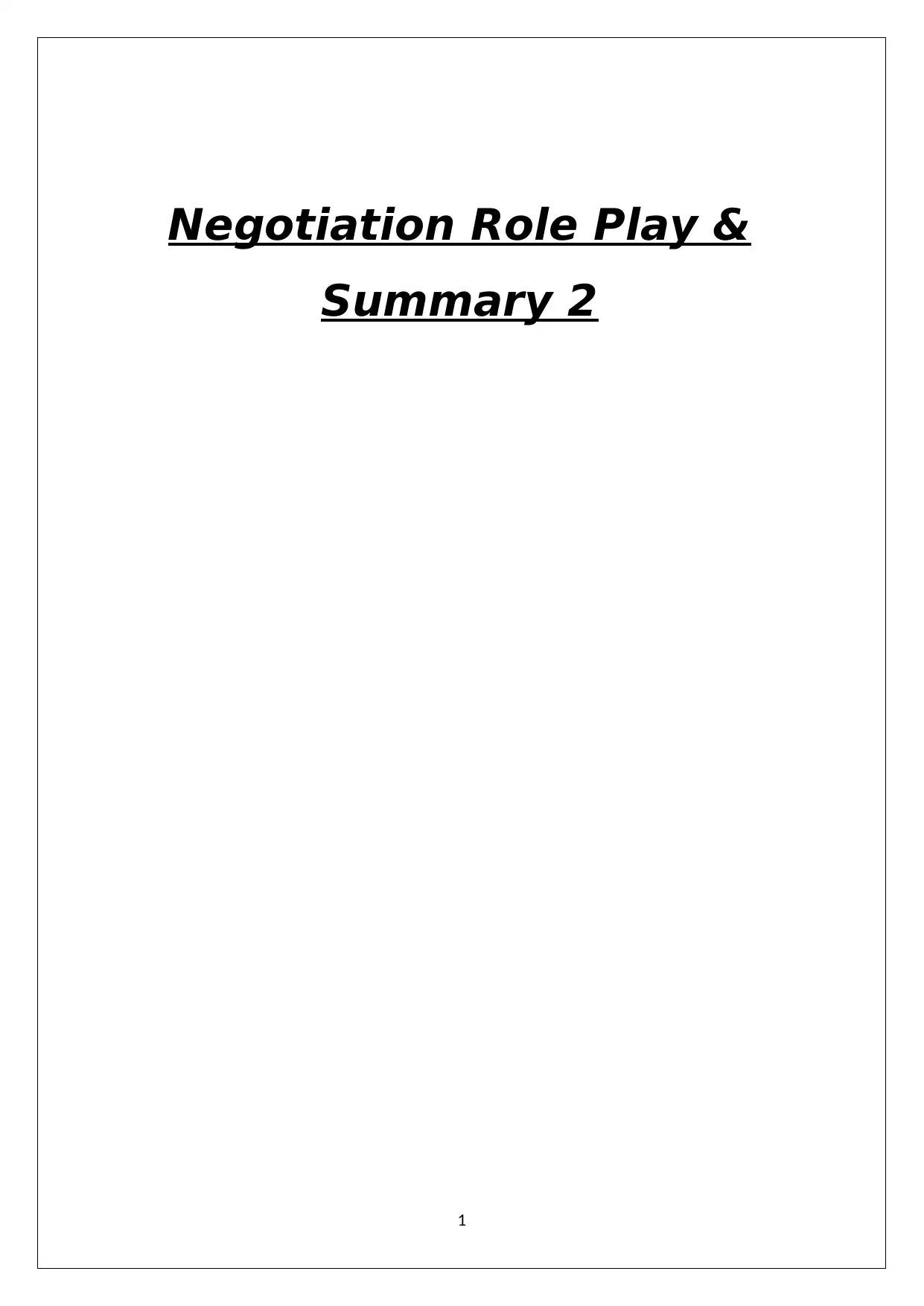
Negotiation Role Play &
Summary 2
1
Summary 2
1
Paraphrase This Document
Need a fresh take? Get an instant paraphrase of this document with our AI Paraphraser
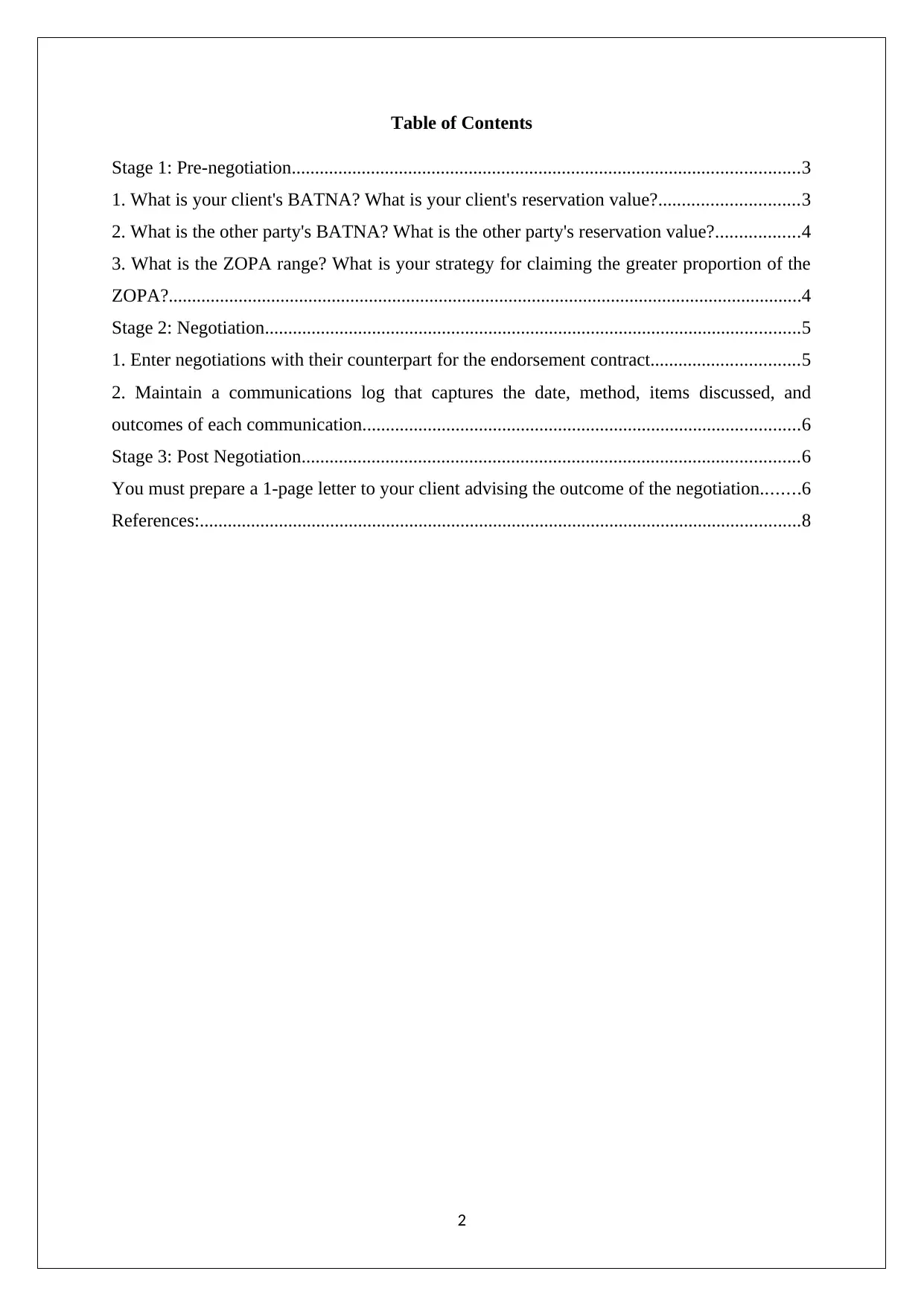
Table of Contents
Stage 1: Pre-negotiation.............................................................................................................3
1. What is your client's BATNA? What is your client's reservation value?..............................3
2. What is the other party's BATNA? What is the other party's reservation value?..................4
3. What is the ZOPA range? What is your strategy for claiming the greater proportion of the
ZOPA?........................................................................................................................................4
Stage 2: Negotiation...................................................................................................................5
1. Enter negotiations with their counterpart for the endorsement contract................................5
2. Maintain a communications log that captures the date, method, items discussed, and
outcomes of each communication..............................................................................................6
Stage 3: Post Negotiation...........................................................................................................6
You must prepare a 1-page letter to your client advising the outcome of the negotiation........6
References:.................................................................................................................................8
2
Stage 1: Pre-negotiation.............................................................................................................3
1. What is your client's BATNA? What is your client's reservation value?..............................3
2. What is the other party's BATNA? What is the other party's reservation value?..................4
3. What is the ZOPA range? What is your strategy for claiming the greater proportion of the
ZOPA?........................................................................................................................................4
Stage 2: Negotiation...................................................................................................................5
1. Enter negotiations with their counterpart for the endorsement contract................................5
2. Maintain a communications log that captures the date, method, items discussed, and
outcomes of each communication..............................................................................................6
Stage 3: Post Negotiation...........................................................................................................6
You must prepare a 1-page letter to your client advising the outcome of the negotiation........6
References:.................................................................................................................................8
2
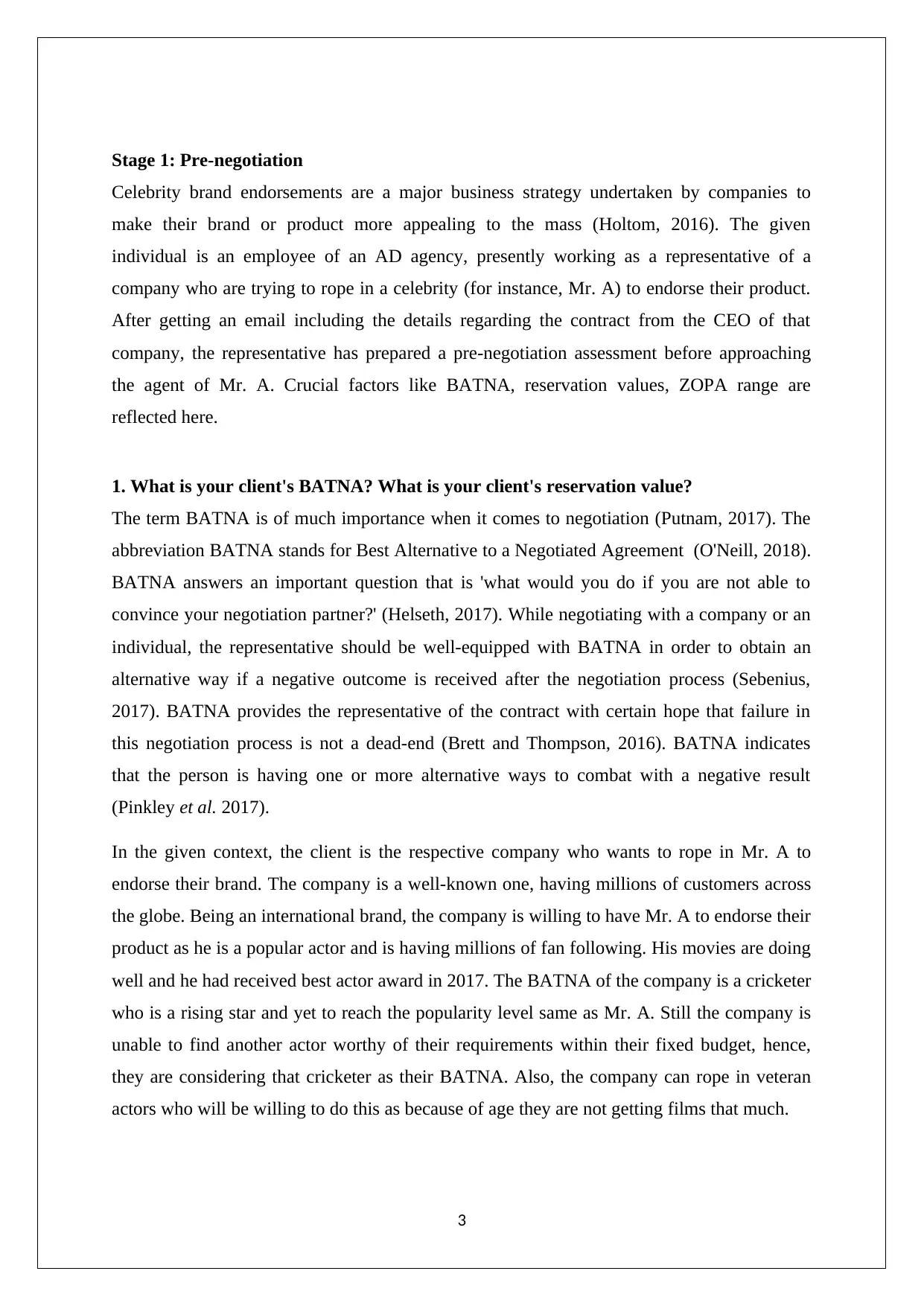
Stage 1: Pre-negotiation
Celebrity brand endorsements are a major business strategy undertaken by companies to
make their brand or product more appealing to the mass (Holtom, 2016). The given
individual is an employee of an AD agency, presently working as a representative of a
company who are trying to rope in a celebrity (for instance, Mr. A) to endorse their product.
After getting an email including the details regarding the contract from the CEO of that
company, the representative has prepared a pre-negotiation assessment before approaching
the agent of Mr. A. Crucial factors like BATNA, reservation values, ZOPA range are
reflected here.
1. What is your client's BATNA? What is your client's reservation value?
The term BATNA is of much importance when it comes to negotiation (Putnam, 2017). The
abbreviation BATNA stands for Best Alternative to a Negotiated Agreement (O'Neill, 2018).
BATNA answers an important question that is 'what would you do if you are not able to
convince your negotiation partner?' (Helseth, 2017). While negotiating with a company or an
individual, the representative should be well-equipped with BATNA in order to obtain an
alternative way if a negative outcome is received after the negotiation process (Sebenius,
2017). BATNA provides the representative of the contract with certain hope that failure in
this negotiation process is not a dead-end (Brett and Thompson, 2016). BATNA indicates
that the person is having one or more alternative ways to combat with a negative result
(Pinkley et al. 2017).
In the given context, the client is the respective company who wants to rope in Mr. A to
endorse their brand. The company is a well-known one, having millions of customers across
the globe. Being an international brand, the company is willing to have Mr. A to endorse their
product as he is a popular actor and is having millions of fan following. His movies are doing
well and he had received best actor award in 2017. The BATNA of the company is a cricketer
who is a rising star and yet to reach the popularity level same as Mr. A. Still the company is
unable to find another actor worthy of their requirements within their fixed budget, hence,
they are considering that cricketer as their BATNA. Also, the company can rope in veteran
actors who will be willing to do this as because of age they are not getting films that much.
3
Celebrity brand endorsements are a major business strategy undertaken by companies to
make their brand or product more appealing to the mass (Holtom, 2016). The given
individual is an employee of an AD agency, presently working as a representative of a
company who are trying to rope in a celebrity (for instance, Mr. A) to endorse their product.
After getting an email including the details regarding the contract from the CEO of that
company, the representative has prepared a pre-negotiation assessment before approaching
the agent of Mr. A. Crucial factors like BATNA, reservation values, ZOPA range are
reflected here.
1. What is your client's BATNA? What is your client's reservation value?
The term BATNA is of much importance when it comes to negotiation (Putnam, 2017). The
abbreviation BATNA stands for Best Alternative to a Negotiated Agreement (O'Neill, 2018).
BATNA answers an important question that is 'what would you do if you are not able to
convince your negotiation partner?' (Helseth, 2017). While negotiating with a company or an
individual, the representative should be well-equipped with BATNA in order to obtain an
alternative way if a negative outcome is received after the negotiation process (Sebenius,
2017). BATNA provides the representative of the contract with certain hope that failure in
this negotiation process is not a dead-end (Brett and Thompson, 2016). BATNA indicates
that the person is having one or more alternative ways to combat with a negative result
(Pinkley et al. 2017).
In the given context, the client is the respective company who wants to rope in Mr. A to
endorse their brand. The company is a well-known one, having millions of customers across
the globe. Being an international brand, the company is willing to have Mr. A to endorse their
product as he is a popular actor and is having millions of fan following. His movies are doing
well and he had received best actor award in 2017. The BATNA of the company is a cricketer
who is a rising star and yet to reach the popularity level same as Mr. A. Still the company is
unable to find another actor worthy of their requirements within their fixed budget, hence,
they are considering that cricketer as their BATNA. Also, the company can rope in veteran
actors who will be willing to do this as because of age they are not getting films that much.
3
⊘ This is a preview!⊘
Do you want full access?
Subscribe today to unlock all pages.

Trusted by 1+ million students worldwide
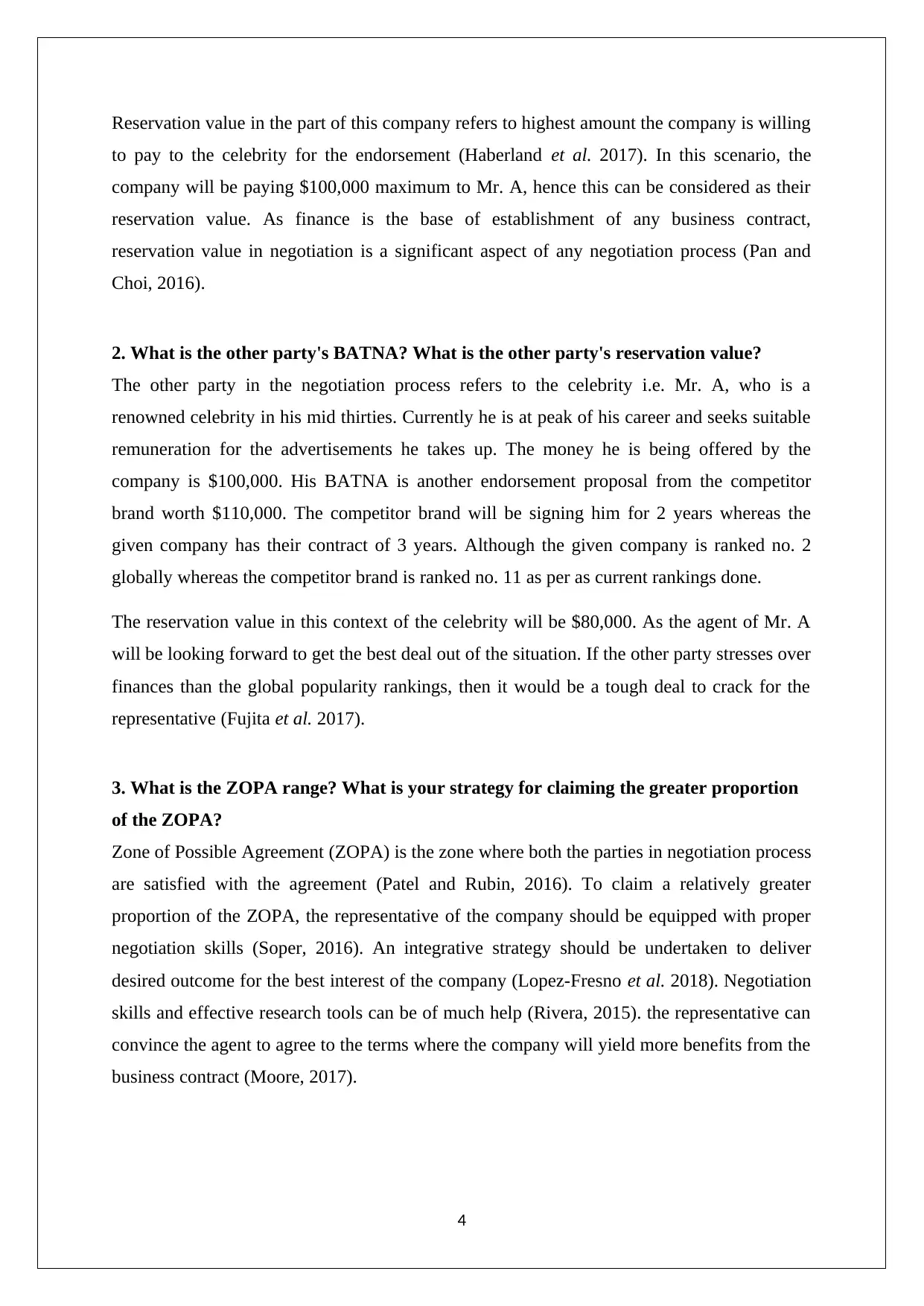
Reservation value in the part of this company refers to highest amount the company is willing
to pay to the celebrity for the endorsement (Haberland et al. 2017). In this scenario, the
company will be paying $100,000 maximum to Mr. A, hence this can be considered as their
reservation value. As finance is the base of establishment of any business contract,
reservation value in negotiation is a significant aspect of any negotiation process (Pan and
Choi, 2016).
2. What is the other party's BATNA? What is the other party's reservation value?
The other party in the negotiation process refers to the celebrity i.e. Mr. A, who is a
renowned celebrity in his mid thirties. Currently he is at peak of his career and seeks suitable
remuneration for the advertisements he takes up. The money he is being offered by the
company is $100,000. His BATNA is another endorsement proposal from the competitor
brand worth $110,000. The competitor brand will be signing him for 2 years whereas the
given company has their contract of 3 years. Although the given company is ranked no. 2
globally whereas the competitor brand is ranked no. 11 as per as current rankings done.
The reservation value in this context of the celebrity will be $80,000. As the agent of Mr. A
will be looking forward to get the best deal out of the situation. If the other party stresses over
finances than the global popularity rankings, then it would be a tough deal to crack for the
representative (Fujita et al. 2017).
3. What is the ZOPA range? What is your strategy for claiming the greater proportion
of the ZOPA?
Zone of Possible Agreement (ZOPA) is the zone where both the parties in negotiation process
are satisfied with the agreement (Patel and Rubin, 2016). To claim a relatively greater
proportion of the ZOPA, the representative of the company should be equipped with proper
negotiation skills (Soper, 2016). An integrative strategy should be undertaken to deliver
desired outcome for the best interest of the company (Lopez-Fresno et al. 2018). Negotiation
skills and effective research tools can be of much help (Rivera, 2015). the representative can
convince the agent to agree to the terms where the company will yield more benefits from the
business contract (Moore, 2017).
4
to pay to the celebrity for the endorsement (Haberland et al. 2017). In this scenario, the
company will be paying $100,000 maximum to Mr. A, hence this can be considered as their
reservation value. As finance is the base of establishment of any business contract,
reservation value in negotiation is a significant aspect of any negotiation process (Pan and
Choi, 2016).
2. What is the other party's BATNA? What is the other party's reservation value?
The other party in the negotiation process refers to the celebrity i.e. Mr. A, who is a
renowned celebrity in his mid thirties. Currently he is at peak of his career and seeks suitable
remuneration for the advertisements he takes up. The money he is being offered by the
company is $100,000. His BATNA is another endorsement proposal from the competitor
brand worth $110,000. The competitor brand will be signing him for 2 years whereas the
given company has their contract of 3 years. Although the given company is ranked no. 2
globally whereas the competitor brand is ranked no. 11 as per as current rankings done.
The reservation value in this context of the celebrity will be $80,000. As the agent of Mr. A
will be looking forward to get the best deal out of the situation. If the other party stresses over
finances than the global popularity rankings, then it would be a tough deal to crack for the
representative (Fujita et al. 2017).
3. What is the ZOPA range? What is your strategy for claiming the greater proportion
of the ZOPA?
Zone of Possible Agreement (ZOPA) is the zone where both the parties in negotiation process
are satisfied with the agreement (Patel and Rubin, 2016). To claim a relatively greater
proportion of the ZOPA, the representative of the company should be equipped with proper
negotiation skills (Soper, 2016). An integrative strategy should be undertaken to deliver
desired outcome for the best interest of the company (Lopez-Fresno et al. 2018). Negotiation
skills and effective research tools can be of much help (Rivera, 2015). the representative can
convince the agent to agree to the terms where the company will yield more benefits from the
business contract (Moore, 2017).
4
Paraphrase This Document
Need a fresh take? Get an instant paraphrase of this document with our AI Paraphraser
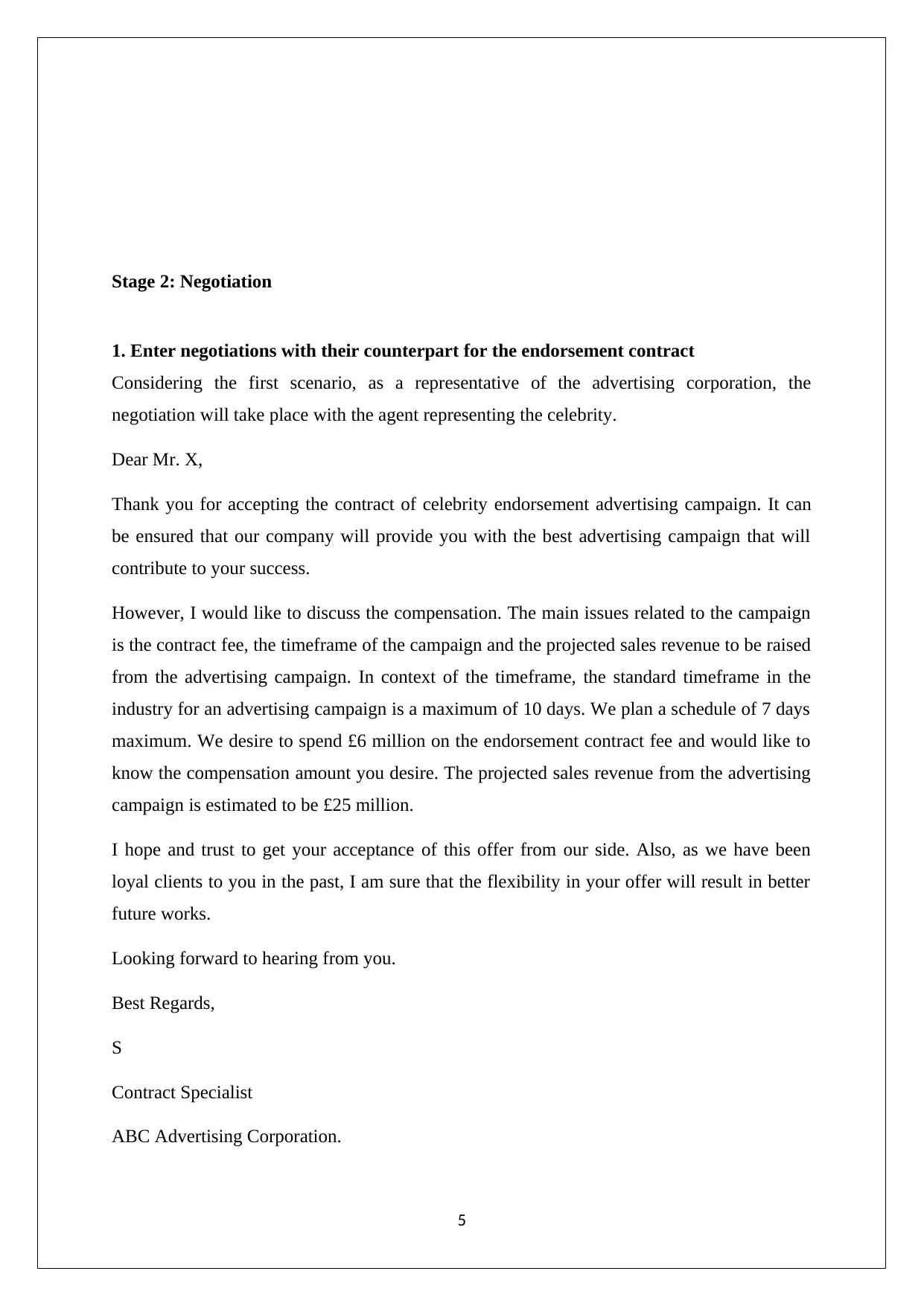
Stage 2: Negotiation
1. Enter negotiations with their counterpart for the endorsement contract
Considering the first scenario, as a representative of the advertising corporation, the
negotiation will take place with the agent representing the celebrity.
Dear Mr. X,
Thank you for accepting the contract of celebrity endorsement advertising campaign. It can
be ensured that our company will provide you with the best advertising campaign that will
contribute to your success.
However, I would like to discuss the compensation. The main issues related to the campaign
is the contract fee, the timeframe of the campaign and the projected sales revenue to be raised
from the advertising campaign. In context of the timeframe, the standard timeframe in the
industry for an advertising campaign is a maximum of 10 days. We plan a schedule of 7 days
maximum. We desire to spend £6 million on the endorsement contract fee and would like to
know the compensation amount you desire. The projected sales revenue from the advertising
campaign is estimated to be £25 million.
I hope and trust to get your acceptance of this offer from our side. Also, as we have been
loyal clients to you in the past, I am sure that the flexibility in your offer will result in better
future works.
Looking forward to hearing from you.
Best Regards,
S
Contract Specialist
ABC Advertising Corporation.
5
1. Enter negotiations with their counterpart for the endorsement contract
Considering the first scenario, as a representative of the advertising corporation, the
negotiation will take place with the agent representing the celebrity.
Dear Mr. X,
Thank you for accepting the contract of celebrity endorsement advertising campaign. It can
be ensured that our company will provide you with the best advertising campaign that will
contribute to your success.
However, I would like to discuss the compensation. The main issues related to the campaign
is the contract fee, the timeframe of the campaign and the projected sales revenue to be raised
from the advertising campaign. In context of the timeframe, the standard timeframe in the
industry for an advertising campaign is a maximum of 10 days. We plan a schedule of 7 days
maximum. We desire to spend £6 million on the endorsement contract fee and would like to
know the compensation amount you desire. The projected sales revenue from the advertising
campaign is estimated to be £25 million.
I hope and trust to get your acceptance of this offer from our side. Also, as we have been
loyal clients to you in the past, I am sure that the flexibility in your offer will result in better
future works.
Looking forward to hearing from you.
Best Regards,
S
Contract Specialist
ABC Advertising Corporation.
5
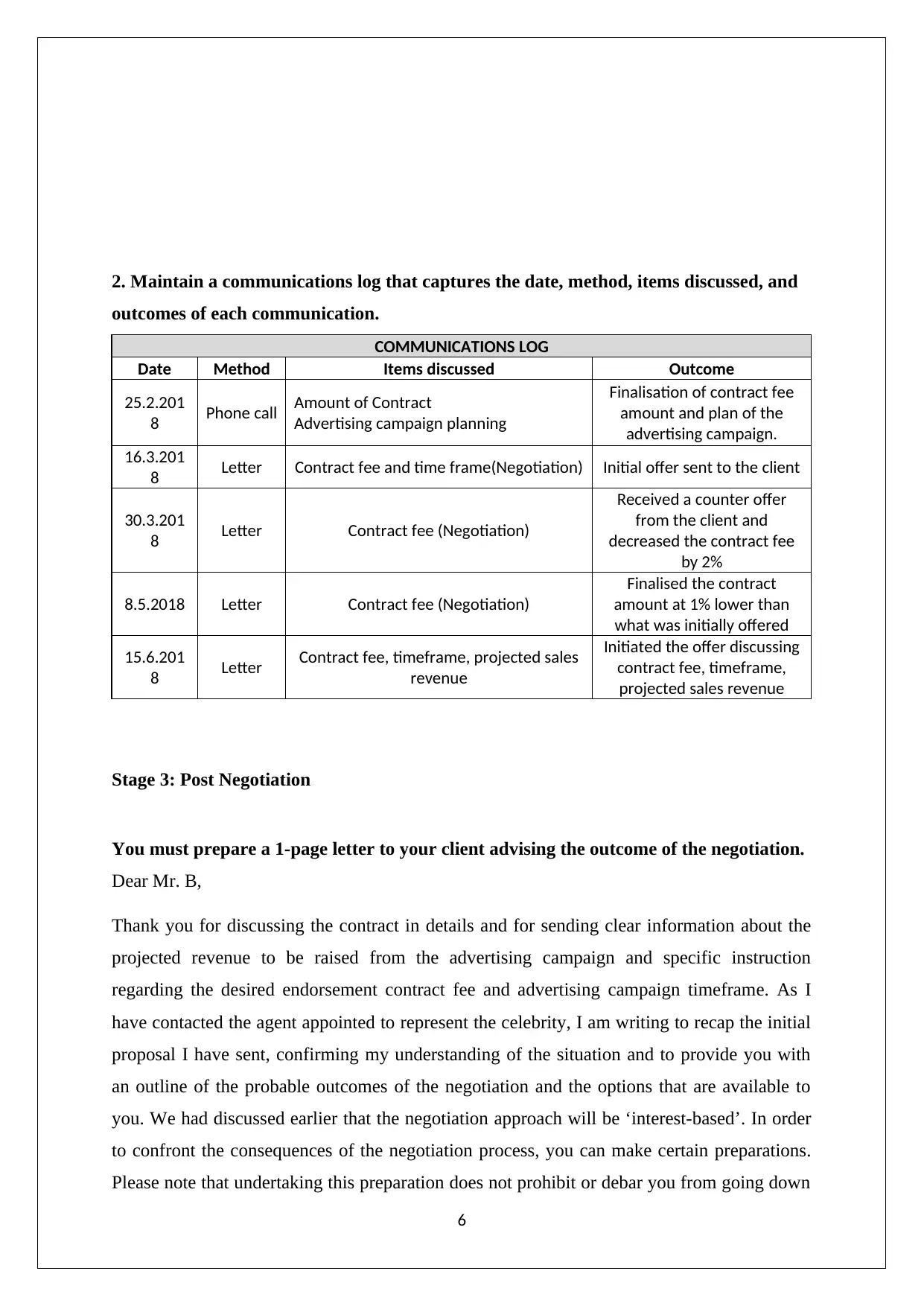
2. Maintain a communications log that captures the date, method, items discussed, and
outcomes of each communication.
COMMUNICATIONS LOG
Date Method Items discussed Outcome
25.2.201
8 Phone call Amount of Contract
Advertising campaign planning
Finalisation of contract fee
amount and plan of the
advertising campaign.
16.3.201
8 Letter Contract fee and time frame(Negotiation) Initial offer sent to the client
30.3.201
8 Letter Contract fee (Negotiation)
Received a counter offer
from the client and
decreased the contract fee
by 2%
8.5.2018 Letter Contract fee (Negotiation)
Finalised the contract
amount at 1% lower than
what was initially offered
15.6.201
8 Letter Contract fee, timeframe, projected sales
revenue
Initiated the offer discussing
contract fee, timeframe,
projected sales revenue
Stage 3: Post Negotiation
You must prepare a 1-page letter to your client advising the outcome of the negotiation.
Dear Mr. B,
Thank you for discussing the contract in details and for sending clear information about the
projected revenue to be raised from the advertising campaign and specific instruction
regarding the desired endorsement contract fee and advertising campaign timeframe. As I
have contacted the agent appointed to represent the celebrity, I am writing to recap the initial
proposal I have sent, confirming my understanding of the situation and to provide you with
an outline of the probable outcomes of the negotiation and the options that are available to
you. We had discussed earlier that the negotiation approach will be ‘interest-based’. In order
to confront the consequences of the negotiation process, you can make certain preparations.
Please note that undertaking this preparation does not prohibit or debar you from going down
6
outcomes of each communication.
COMMUNICATIONS LOG
Date Method Items discussed Outcome
25.2.201
8 Phone call Amount of Contract
Advertising campaign planning
Finalisation of contract fee
amount and plan of the
advertising campaign.
16.3.201
8 Letter Contract fee and time frame(Negotiation) Initial offer sent to the client
30.3.201
8 Letter Contract fee (Negotiation)
Received a counter offer
from the client and
decreased the contract fee
by 2%
8.5.2018 Letter Contract fee (Negotiation)
Finalised the contract
amount at 1% lower than
what was initially offered
15.6.201
8 Letter Contract fee, timeframe, projected sales
revenue
Initiated the offer discussing
contract fee, timeframe,
projected sales revenue
Stage 3: Post Negotiation
You must prepare a 1-page letter to your client advising the outcome of the negotiation.
Dear Mr. B,
Thank you for discussing the contract in details and for sending clear information about the
projected revenue to be raised from the advertising campaign and specific instruction
regarding the desired endorsement contract fee and advertising campaign timeframe. As I
have contacted the agent appointed to represent the celebrity, I am writing to recap the initial
proposal I have sent, confirming my understanding of the situation and to provide you with
an outline of the probable outcomes of the negotiation and the options that are available to
you. We had discussed earlier that the negotiation approach will be ‘interest-based’. In order
to confront the consequences of the negotiation process, you can make certain preparations.
Please note that undertaking this preparation does not prohibit or debar you from going down
6
⊘ This is a preview!⊘
Do you want full access?
Subscribe today to unlock all pages.

Trusted by 1+ million students worldwide
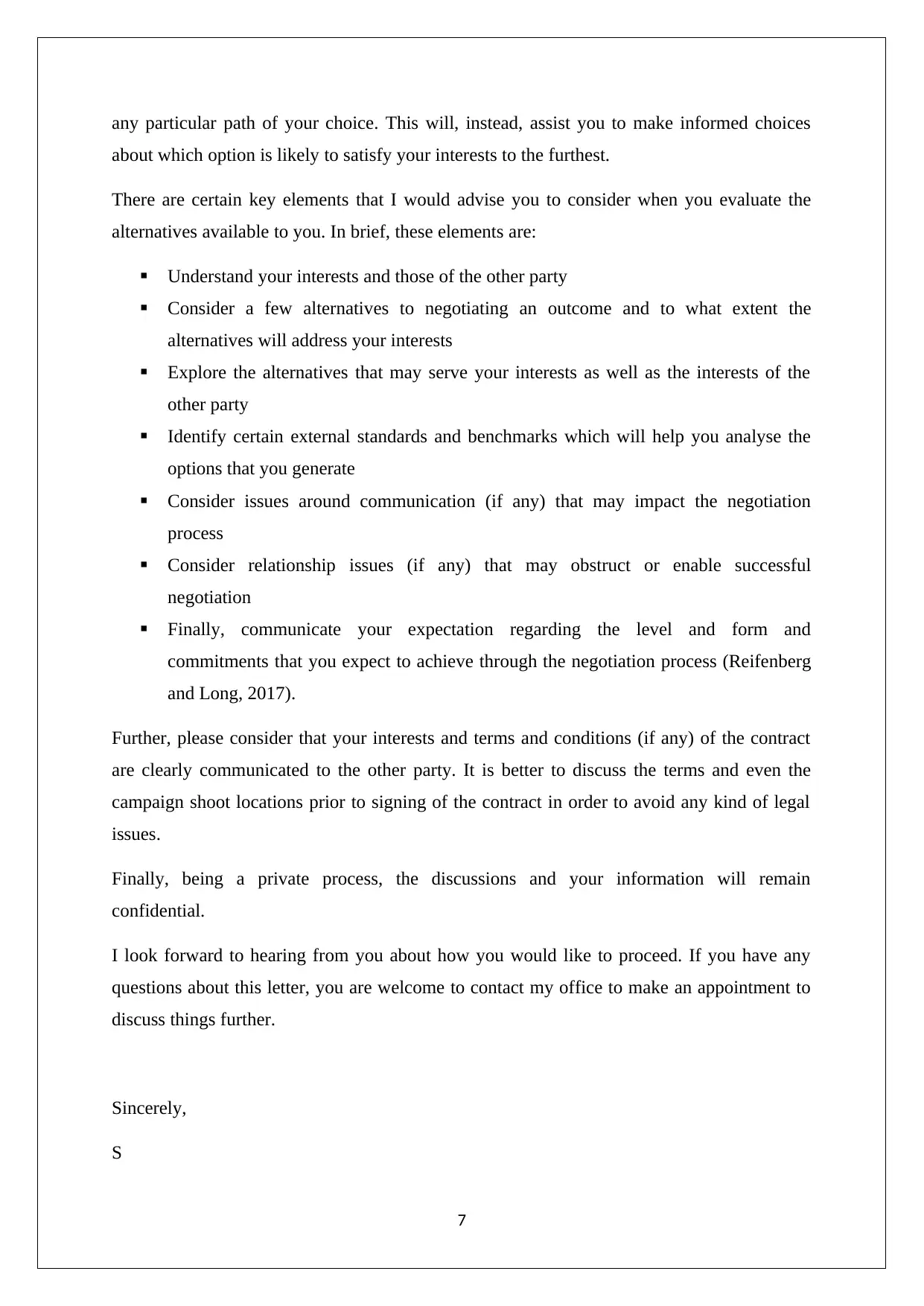
any particular path of your choice. This will, instead, assist you to make informed choices
about which option is likely to satisfy your interests to the furthest.
There are certain key elements that I would advise you to consider when you evaluate the
alternatives available to you. In brief, these elements are:
Understand your interests and those of the other party
Consider a few alternatives to negotiating an outcome and to what extent the
alternatives will address your interests
Explore the alternatives that may serve your interests as well as the interests of the
other party
Identify certain external standards and benchmarks which will help you analyse the
options that you generate
Consider issues around communication (if any) that may impact the negotiation
process
Consider relationship issues (if any) that may obstruct or enable successful
negotiation
Finally, communicate your expectation regarding the level and form and
commitments that you expect to achieve through the negotiation process (Reifenberg
and Long, 2017).
Further, please consider that your interests and terms and conditions (if any) of the contract
are clearly communicated to the other party. It is better to discuss the terms and even the
campaign shoot locations prior to signing of the contract in order to avoid any kind of legal
issues.
Finally, being a private process, the discussions and your information will remain
confidential.
I look forward to hearing from you about how you would like to proceed. If you have any
questions about this letter, you are welcome to contact my office to make an appointment to
discuss things further.
Sincerely,
S
7
about which option is likely to satisfy your interests to the furthest.
There are certain key elements that I would advise you to consider when you evaluate the
alternatives available to you. In brief, these elements are:
Understand your interests and those of the other party
Consider a few alternatives to negotiating an outcome and to what extent the
alternatives will address your interests
Explore the alternatives that may serve your interests as well as the interests of the
other party
Identify certain external standards and benchmarks which will help you analyse the
options that you generate
Consider issues around communication (if any) that may impact the negotiation
process
Consider relationship issues (if any) that may obstruct or enable successful
negotiation
Finally, communicate your expectation regarding the level and form and
commitments that you expect to achieve through the negotiation process (Reifenberg
and Long, 2017).
Further, please consider that your interests and terms and conditions (if any) of the contract
are clearly communicated to the other party. It is better to discuss the terms and even the
campaign shoot locations prior to signing of the contract in order to avoid any kind of legal
issues.
Finally, being a private process, the discussions and your information will remain
confidential.
I look forward to hearing from you about how you would like to proceed. If you have any
questions about this letter, you are welcome to contact my office to make an appointment to
discuss things further.
Sincerely,
S
7
Paraphrase This Document
Need a fresh take? Get an instant paraphrase of this document with our AI Paraphraser

8
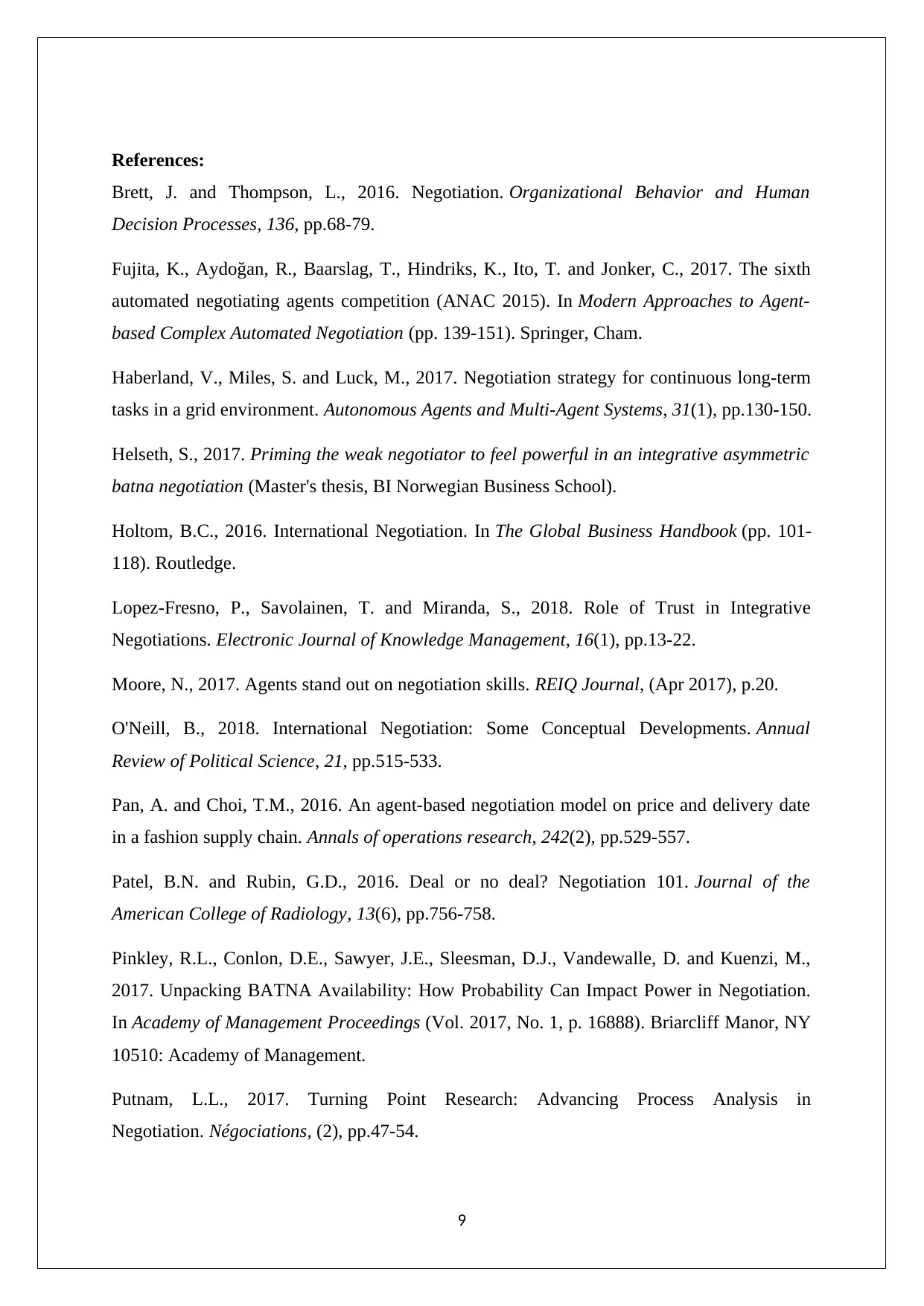
References:
Brett, J. and Thompson, L., 2016. Negotiation. Organizational Behavior and Human
Decision Processes, 136, pp.68-79.
Fujita, K., Aydoğan, R., Baarslag, T., Hindriks, K., Ito, T. and Jonker, C., 2017. The sixth
automated negotiating agents competition (ANAC 2015). In Modern Approaches to Agent-
based Complex Automated Negotiation (pp. 139-151). Springer, Cham.
Haberland, V., Miles, S. and Luck, M., 2017. Negotiation strategy for continuous long-term
tasks in a grid environment. Autonomous Agents and Multi-Agent Systems, 31(1), pp.130-150.
Helseth, S., 2017. Priming the weak negotiator to feel powerful in an integrative asymmetric
batna negotiation (Master's thesis, BI Norwegian Business School).
Holtom, B.C., 2016. International Negotiation. In The Global Business Handbook (pp. 101-
118). Routledge.
Lopez-Fresno, P., Savolainen, T. and Miranda, S., 2018. Role of Trust in Integrative
Negotiations. Electronic Journal of Knowledge Management, 16(1), pp.13-22.
Moore, N., 2017. Agents stand out on negotiation skills. REIQ Journal, (Apr 2017), p.20.
O'Neill, B., 2018. International Negotiation: Some Conceptual Developments. Annual
Review of Political Science, 21, pp.515-533.
Pan, A. and Choi, T.M., 2016. An agent-based negotiation model on price and delivery date
in a fashion supply chain. Annals of operations research, 242(2), pp.529-557.
Patel, B.N. and Rubin, G.D., 2016. Deal or no deal? Negotiation 101. Journal of the
American College of Radiology, 13(6), pp.756-758.
Pinkley, R.L., Conlon, D.E., Sawyer, J.E., Sleesman, D.J., Vandewalle, D. and Kuenzi, M.,
2017. Unpacking BATNA Availability: How Probability Can Impact Power in Negotiation.
In Academy of Management Proceedings (Vol. 2017, No. 1, p. 16888). Briarcliff Manor, NY
10510: Academy of Management.
Putnam, L.L., 2017. Turning Point Research: Advancing Process Analysis in
Negotiation. Négociations, (2), pp.47-54.
9
Brett, J. and Thompson, L., 2016. Negotiation. Organizational Behavior and Human
Decision Processes, 136, pp.68-79.
Fujita, K., Aydoğan, R., Baarslag, T., Hindriks, K., Ito, T. and Jonker, C., 2017. The sixth
automated negotiating agents competition (ANAC 2015). In Modern Approaches to Agent-
based Complex Automated Negotiation (pp. 139-151). Springer, Cham.
Haberland, V., Miles, S. and Luck, M., 2017. Negotiation strategy for continuous long-term
tasks in a grid environment. Autonomous Agents and Multi-Agent Systems, 31(1), pp.130-150.
Helseth, S., 2017. Priming the weak negotiator to feel powerful in an integrative asymmetric
batna negotiation (Master's thesis, BI Norwegian Business School).
Holtom, B.C., 2016. International Negotiation. In The Global Business Handbook (pp. 101-
118). Routledge.
Lopez-Fresno, P., Savolainen, T. and Miranda, S., 2018. Role of Trust in Integrative
Negotiations. Electronic Journal of Knowledge Management, 16(1), pp.13-22.
Moore, N., 2017. Agents stand out on negotiation skills. REIQ Journal, (Apr 2017), p.20.
O'Neill, B., 2018. International Negotiation: Some Conceptual Developments. Annual
Review of Political Science, 21, pp.515-533.
Pan, A. and Choi, T.M., 2016. An agent-based negotiation model on price and delivery date
in a fashion supply chain. Annals of operations research, 242(2), pp.529-557.
Patel, B.N. and Rubin, G.D., 2016. Deal or no deal? Negotiation 101. Journal of the
American College of Radiology, 13(6), pp.756-758.
Pinkley, R.L., Conlon, D.E., Sawyer, J.E., Sleesman, D.J., Vandewalle, D. and Kuenzi, M.,
2017. Unpacking BATNA Availability: How Probability Can Impact Power in Negotiation.
In Academy of Management Proceedings (Vol. 2017, No. 1, p. 16888). Briarcliff Manor, NY
10510: Academy of Management.
Putnam, L.L., 2017. Turning Point Research: Advancing Process Analysis in
Negotiation. Négociations, (2), pp.47-54.
9
⊘ This is a preview!⊘
Do you want full access?
Subscribe today to unlock all pages.

Trusted by 1+ million students worldwide
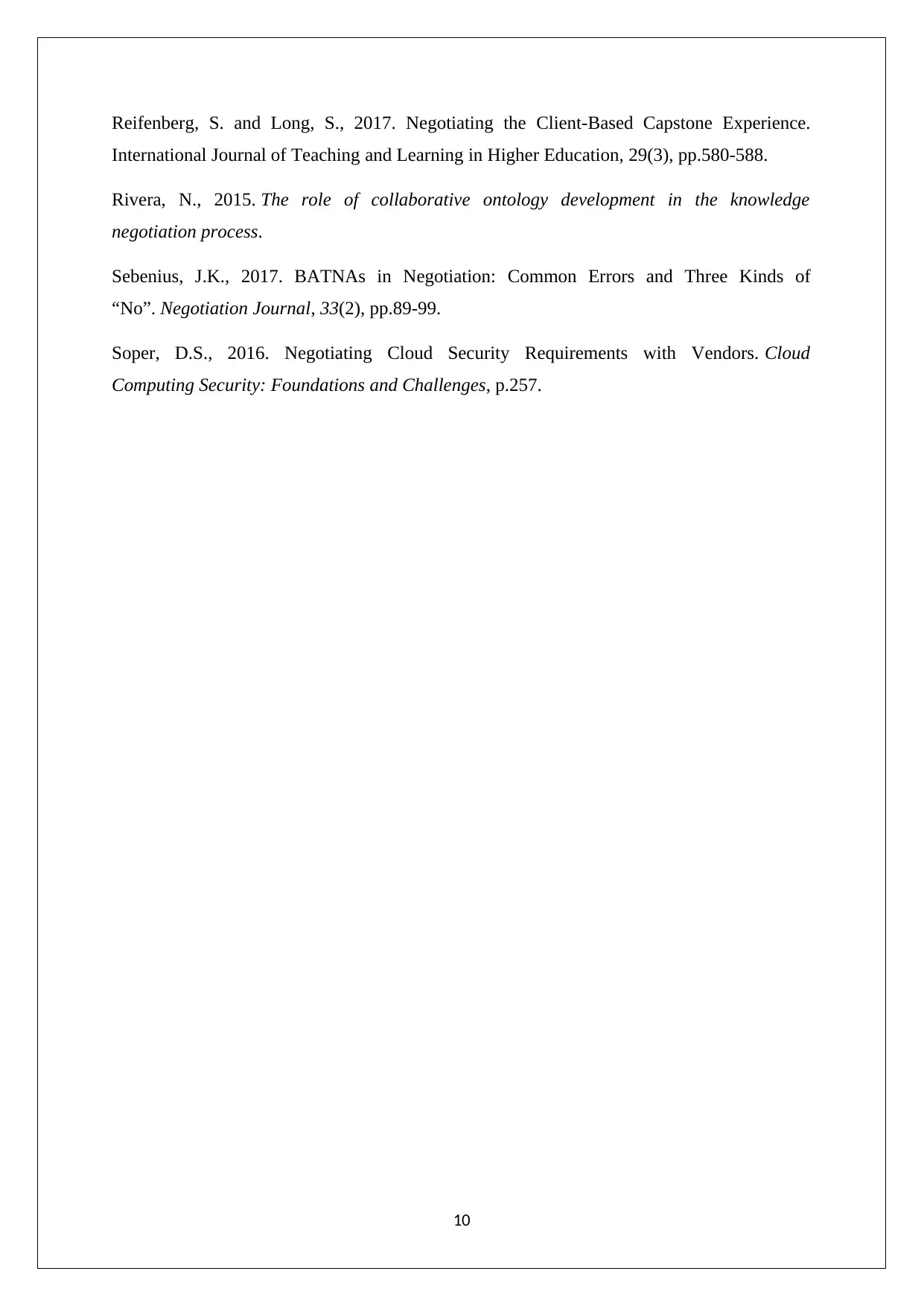
Reifenberg, S. and Long, S., 2017. Negotiating the Client-Based Capstone Experience.
International Journal of Teaching and Learning in Higher Education, 29(3), pp.580-588.
Rivera, N., 2015. The role of collaborative ontology development in the knowledge
negotiation process.
Sebenius, J.K., 2017. BATNAs in Negotiation: Common Errors and Three Kinds of
“No”. Negotiation Journal, 33(2), pp.89-99.
Soper, D.S., 2016. Negotiating Cloud Security Requirements with Vendors. Cloud
Computing Security: Foundations and Challenges, p.257.
10
International Journal of Teaching and Learning in Higher Education, 29(3), pp.580-588.
Rivera, N., 2015. The role of collaborative ontology development in the knowledge
negotiation process.
Sebenius, J.K., 2017. BATNAs in Negotiation: Common Errors and Three Kinds of
“No”. Negotiation Journal, 33(2), pp.89-99.
Soper, D.S., 2016. Negotiating Cloud Security Requirements with Vendors. Cloud
Computing Security: Foundations and Challenges, p.257.
10
1 out of 10
Related Documents
Your All-in-One AI-Powered Toolkit for Academic Success.
+13062052269
info@desklib.com
Available 24*7 on WhatsApp / Email
![[object Object]](/_next/static/media/star-bottom.7253800d.svg)
Unlock your academic potential
Copyright © 2020–2025 A2Z Services. All Rights Reserved. Developed and managed by ZUCOL.




